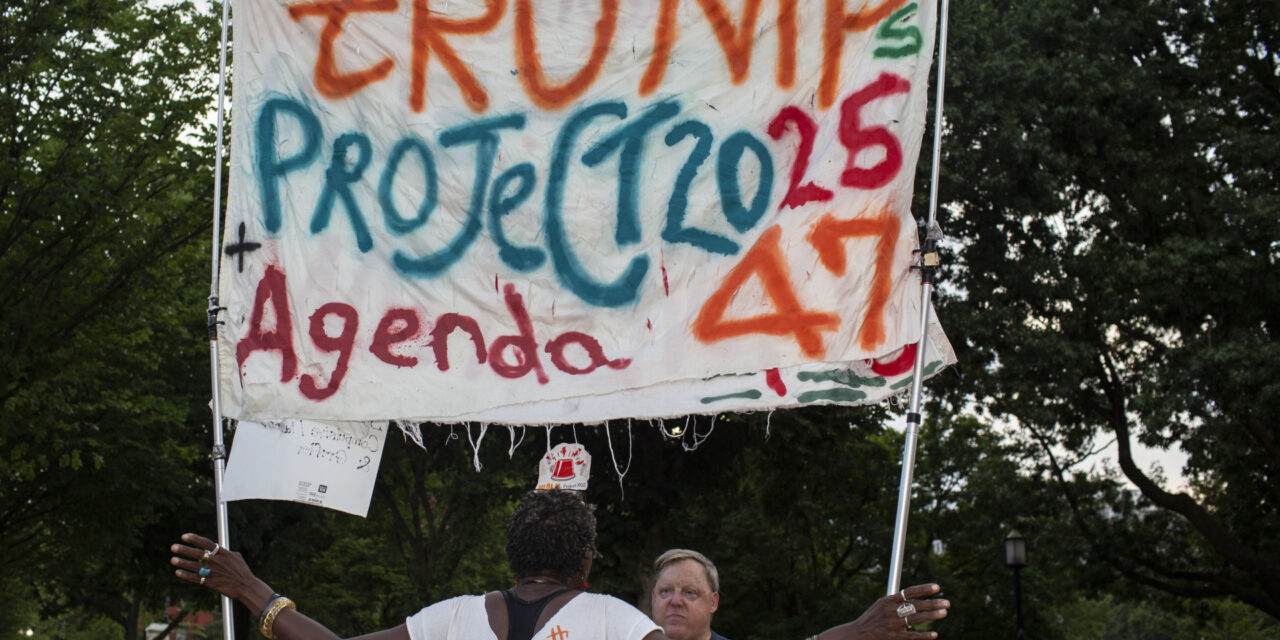
In many Black households, the living room is the communal gathering spot where some of life’s most memorable moments and essential conversations occur. It’s time for the Black delegation to gather as a united front and take a seat in the proverbial living room to discuss the dogmatic proposal of Project 2025.
At face value, Project 2025 comes off as nothing more than a lengthy piece of prejudice rhetoric aimed at perpetuating systemic norms that have disproportionately disenfranchised Black communities for decades. However, the proposed plan to allegedly “build conservative victory” is egregious and antithetical to what many Americans believe it should be.
We’re not talking about infractions like raisins in the potato salad or clapping on the offbeat; this nearly 1,000-page proposal would disrupt livelihoods, compromise equity and potentially dismantle years of hard-earned progress people have tirelessly worked to attain.
Created by the Heritage Foundation, Project 2025 is a presidential transition plan that seeks to overhaul systems and the government as we know it. More than 100 conservative contributors, several former leaders in the Trump administration, wrote chapters and sections in the document, including Russ Vought, who led the Office of Management and Budget; former acting Defense Secretary Chris Miller and Roger Severino, former director of the Office of Civil Rights at the Department of Health and Human Services. Yet, Trump has been adamant about not being associated with the formation of this document.
The massive document builds upon literature written in 1981 ahead of President Ronald Reagan’s administration. An earlier iteration was also compiled in 2016 when Trump was elected president. If Trump is elected for a second term, the framers of Project 2025 seek to hone in on the following themes outlined in their document: revitalize the family as the cornerstone of American society; reduce the influence of the bureaucratic system; protect the nation’s sovereignty and borders and uphold the inherent individual rights to live freely.
While conservative Republicans who have empathy and sound judgment do exist, the political actors who have modeled their behavior after Trump make that sentiment more and more unbelievable as time goes on. Project 2025 is a shining example of what happens when they get on the wrong side of tunnel vision, creating widespread negative implications for Black individuals and families.
If you haven’t settled and filled your cup in the proverbial living room by now, pull up a chair and get into this breakdown of some of the ways Project 2025 could impact you and your loved one’s entire way of living.
Governance and Bureaucracy
The plan seeks to enforce deep-rooted ideals around minimizing government. This means eliminating departments and programs regulating life and civil liberties. For example, personnel and hiring decisions could be impacted solely by the level of loyalty to the president’s agenda. It redirects an imbalance of power to the executive branch that could affect diversity in government hiring and de-prioritize issues relevant to Black communities.
As we know, restructuring the government this way could cause the downsizing or outright elimination of agencies like the Federal Bureau of Investigation (FBI), which Project 2025 describes as a “bloated, arrogant, increasingly lawless organization.” Now, the FBI doesn’t earn a lot of cool points with Black people (e.g., the death and harassment of Dr. Martin Luther King, Jr.). Still, it has proven to be an agency, particularly as parsed out on the state levels, that has sometimes assisted in advancing justice.
One of the most egregious bureaucratic suggestions is eliminating the Department of Education. American youth need more support, and many public schools lack the necessary funding to ensure students are adequately prepared for their chosen careers. Claiming the agency is bloated and full of unnecessary bureaucracy can lead to it being cut down significantly, which can eliminate Title I funding, which supports schools with high numbers of low-income students, and Pell Grants, essential for many Black students attending college, which could be reduced or restructured.
National Defense and Immigration
Conservatives love to scream about how unsafe the border has become. While most won’t argue that border control needs reform, the way in which Project 2025 seeks to regulate immigration policy is hypocritical at best. They do know that the United States is a country based on immigration, right? The founders of this nation developed it on stolen land and robbed Indigenous people of their liberties and freedoms. They didn’t build this!
Harsh immigration policies will impact Black people from across the diaspora who could be seeking asylum or are in pursuit of another take on life for educational or economic advancement. Increased surveillance and law enforcement powers surrounding the border might lead to racial profiling and targeting of Black immigrants.
In that same vein, the Department of Defense can be completely changed as the world knows it. Isn’t it ironic the most gun-happy union would seek to enforce measures that will ultimately reduce the protection and safety of the nation? A focus on reducing costs might lead to cuts in military pay, benefits or support services, which could disproportionately affect Black service members who rely on these resources.
Programs under organizations like the National Guard and Reserve that support local communities, such as disaster relief and community outreach, might see reduced funding. These programs often provide critical services in emergencies, and cuts could negatively affect Black communities that rely on these resources. Remember Hurricane Katrina and New Orleans? If you thought Kanye West put President Bush on blast for hating Black people – this proposal will have nothing on that.
General Welfare And Health Access
I know this conversation should happen in the proverbial living room, but still, this section may cause you to retreat to the bathroom because ultra-conservatives seem to be obsessed with what happens with the most private and intimate parts of human life.
Changes to healthcare policies, such as Medicare and Medicaid adjustments, could limit access to affordable healthcare under Project 2025. This could disproportionately impact Black Americans, who already encounter disparities in healthcare access and outcomes, making it more difficult to obtain essential medical care and worsening existing health inequities.
Since we are here, let the record reflect that abortion rights, at its core, is a medical issue and not one that personal morals and beliefs should inform. Holding true to faith convictions and individual values is central to the freedom of expression the country alleges to uphold. However, when those individual beliefs become the standard, especially when they do not leave space for nuance or context, they become dangerous and reproachful.
Limiting access to abortion and reproductive services disproportionately impacts Black women, who already encounter higher maternal mortality rates and significant barriers to healthcare. Restricted access to safe abortion options could heighten health risks and diminish reproductive autonomy for Black women, further worsening existing disparities.
Social Justice And Civil Rights
Diversity, equity and inclusion (DEI) used to be the most popular person at the lunch table until right-wing media and antagonists began to weaponize it because it exposed their mediocrity. DEI was never implemented to “take someone else’s spot.” Neither was it a replacement for excellence and qualification. DEI is not an either-or but a both-and approach to ensure spaces have true diversity in thought, approach and strategy. The Harvard Business Review produced a paper on how DEI can improve any organization’s adaptability to build inclusion and strengthen its mission and purpose. But, hey, what is empirical evidence and research?
Project 2025 seeks to completely roll back DEI programs within federal agencies and government-funded institutions if implemented. This could include rolling back affirmative action policies and limiting diversity training or initiatives to address systemic inequalities.
Scaling back DEI initiatives could reverse the progress made in addressing racial disparities in education, employment, and government representation. This might lead to fewer opportunities for Black individuals in these areas and reinforce the systemic barriers that DEI programs are designed to overcome.
Project 2025 will also focus on law and order, and the possible reversal of criminal justice reforms could worsen problems like racial profiling, police brutality and mass incarceration. These changes could undermine the strides made in combating systemic racism within the criminal justice system, disproportionately affecting Black individuals and communities.
Economics and Wealth Building
One of the most pervasive tools for wealth accumulation in the United States is homeownership. There may be efforts to deregulate housing markets and decrease federal oversight, resulting in weaker enforcement of fair housing laws. Additionally, there might be an emphasis on diminishing government participation in housing by scaling back the Federal Housing Administration (FHA) and other programs that support first-time homebuyers.
We have long faced housing discrimination, leading to lower homeownership rates compared to other groups. Reduced oversight and enforcement of fair housing laws could worsen redlining and discriminatory lending practices, making it more challenging for Black families to obtain mortgages. Cuts to FHA and other homebuyer assistance programs would further restrict opportunities for Black individuals to purchase homes, thereby widening the racial wealth gap.
Although homeownership is powerful for accumulating wealth, entrepreneurship and small business development are also cornerstones of not just Black founders and business owners but are built into the fabric of what makes the country successful.
Remember, Project 2025 aims to overhaul the functioning of government agencies, viewing them as overly burdensome. As part of this initiative, the SBA’s role would be scaled back, potentially reducing programs that specifically benefit minority-owned businesses. This might involve rolling back loan programs, grants, and other resources that Black entrepreneurs rely on to start and grow their businesses.
SBA programs are crucial for Black entrepreneurs, offering access to capital, mentorship and other essential resources. Reducing these programs could hinder their ability to secure financing, navigate regulations and compete effectively in the marketplace. This could result in fewer successful Black-owned businesses and exacerbate existing economic disparities.
What’s Next?
For a lack of better words, Project 2025 is crass and dogmatic. According to BBC, if Trump is successfully elected, the plan has a $22 million budget to support its implementation immediately after the inauguration. However, Congressman Jared Huffman is leading a cohort of Democrats who have launched the Stop Project 2025 Task Force.
This proverbial living room meeting may have drained you, so head over to the kitchen table and grab a glass of wine and your favorite inspirational literature to keep going until the horizon is a little clearer.




